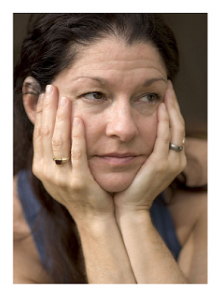I could blame it on my spending problem. You know. Shoes.
 Except I shopped sales and used my own money. The Ex couldn’t have had a problem with that.
Except I shopped sales and used my own money. The Ex couldn’t have had a problem with that.
I could blame it on my cooking. You know. Not enough, or just cooking badly.
Except I learned my way around the kitchen when I married. Hell. He was the one who taught me the basics, though shortly thereafter all cooking duty became mine.
I could blame it on our life in the boudoir, perhaps a more realistic reflection of emotional intimacy in marriage, though frankly that’s a story of “which comes first – the chicken or the egg,” don’t you think?
You know what I’m getting at. Does intimacy lead to sex – or the other way around?
Emotional Intimacy: Relationship Glue?
Of course, emotional intimacy is not as simple as how much sex is enough (or not); it’s the closeness we hope to experience, certainly in marriage, at least some of the time.
Some say sex is relationship glue. (Come to think of it, I suspect I’ve said as much.) Then again, when you’re talking about a committed relationship or marriage, don’t we seek emotional intimacy – the connection that comes from vulnerability, from sharing, from being ourselves?
Hey, how about a few opportunities to wear those shoes – as a woman, for her man?
Love, Sex, and Making Marriage Work
Whether lovemaking leads to intimacy or the other way around, can we agree that our sex lives mirror other aspects of life as a couple? Doesn’t that include communication or its absence?
When one spouse travels constantly, time together is a challenge and time apart takes its toll. Since my divorce, I look back on my marriage and see us as Unmarried Marrieds. Or maybe you prefer Married Unmarrieds. Pick one. They both apply.
As for our differences and problems, they appeared to be few if you were observing the marriage from the outside in. We rarely fought, our life together was calm; then again, our lives were fairly separate and our shared inner lives, almost non-existent. That’s a significant marital issue to overcome, and one that may grow from individual seeds rather than those sown as a couple.
What Does Divorce Teach Us?
In her post “Will Your Problems End With Divorce,” divorce expert Cathy Meyer writes:
…if you are looking for relief from marital problems, especially if you have children… Divorce won’t end your relationship with your ex, it will change it.
In other words, if you have children, divorce does not change the “forever” bond you have with the other parent, but it sure may complicate it. Naturally, cooperative co-parenting makes things more workable, as divorce will eventually ease some situations and, for many of us, exacerbate others.
Describing the types of unresolved issues that persist beyond the actual divorce, the article suggests we may be able to predict which way that will go. Then again, we may not.
Shouldn’t we take those unresolved differences into account?
Mr. Or Mrs. Fix-It? Not So Much
Taking the discussion of what divorce may or may not resolve one step further – when our marital expectations include anticipating that our spouse can “fix us” or fix our life, if our expectations are unreasonable, unrealistic, or simply impossible, then even divorce does not address the core problem.
 We may be the problem, not “us,” not the institution of marriage, and not the spouse’s inability to deliver a life we think we want, a “self” we hope to become.
We may be the problem, not “us,” not the institution of marriage, and not the spouse’s inability to deliver a life we think we want, a “self” we hope to become.
Divorce may distract (among other things) and for years, depending on the situation. But are we obfuscating? Avoiding facing ourselves? Creating commotion instead of addressing real challenges and making real change?
Life (After Divorce) Lessons
Life after divorce has taught me many lessons including what emotional intimacy is – and is not. I have learned to give voice to my own faults, my contradictions, my worth, and simply, the truth of my nature.
I have also come to recognize what I believe is – or was – the truth of my ex’s nature. His issues were his issues and not mine; the lack of emotional intimacy is something I no longer blame myself for.
That said, I see myself more clearly, knowing my tendency to slip chameleon-like into others’ behavior patterns, my need for approval, and a preference for choosing calm over (necessary) confrontation.
Change for the Better, and Better (Future) Relationships
As I’ve grown more aware of these traits, I’ve made explicit efforts to change me, and not repeat my mistakes in those I choose to be with, or who may choose me.
- I have become more clear in my values and unwilling to compromise them.
- I have become more communicative in my needs, in all areas of my life.
- I have been more observant of others’ needs, and my ability to fulfill them.
- While I’m gullible (and know it), I have become a better judge of character.
I take responsibility for speaking up for myself, and I have ceased to “own” fault for everything that didn’t work in marriage.
Emotional Intimacy? Talk, Sex, Laughter, Tears
I never expected a spouse to create a life for me in which I would be “happy” or all needs magically met. To some degree, I had the opposite problem. I expected too little and accepted too little, waiting far too long to express my recognition that our marriage was an “unmarriage,” lacking in the quality of closeness I have known since – in subsequent committed relationships.
 I realize that we never shared the quality of talk, sex, laughter, and tears that I now think of as characterizing a truly intimate relationship. Our values were too different, our communication too spotty, our willingness to coast as is, at the time, seemingly easier.
I realize that we never shared the quality of talk, sex, laughter, and tears that I now think of as characterizing a truly intimate relationship. Our values were too different, our communication too spotty, our willingness to coast as is, at the time, seemingly easier.
There is no intimacy in that.
Forever: Parenting Bonds
Had I truly understood the ways we would be bound together forever – through our children – I may have wised up when it came to divorce and the life that has followed: I would have paid closer attention to the ways my spouse and I interacted as a couple and separately, many of which were problematic.
Marriages may not be forever, but parenting is – and that means shared parenting whether that sharing is one of absence or presence. Though hindsight is indeed 20-20, I like to think that if I had resources a dozen years ago that are available today, I would’ve been better prepared for what lay ahead. As recommended in the article I cite, I would’ve been more thorough in coming to grips with what was “me,” what was “him,” and what was “us.”
In so doing, I could’ve better predicted how we would co-parent, or not. At the very least, my expectations would have been more realistic.
You May Also Enjoy
D.A.
I thought your post a few days ago about not talking suggested, but didn’t actually address, an elephant in the room – the material in today’s writing. Sometimes you refrain from talking out of respect for the relationship, but sometimes you refrain out of necessity, or because it doesn’t work, is impossible, or just digs the hole deeper. Today’s piece completed the circle nicely…..
I refrain for all of the reasons you mention, Robert – respect for the relationship as well as the individuals involved, and yes, out of necessity for many reasons.
And we all experience and understand each other differently, capable of change if we wish to change, and behaving differently with different people. Certainly both factor into intimacy, and therefore, the quality of a marriage. None of us is without our part in situations that work or don’t.
I hope that if this piece of writing seems to complete a circle, it does so respectfully as well.
I recall wanting so desperately to ‘fix’ my husband and being irritated with a therapist who, wisely, said I could only change the way I reacted to him.
I agree with your thoughts about parenting and the challenges in divorce. Mine was easy for a number of reasons–as I became the only parent in many ways. I wish more people understood the nature of parenting as a divorced person because it’s tough.
This is what I think; an opinion that could be way off.
I think women seek emotional intimacy before sexual intimacy that is desired and satisfies a part of heart and soul.
I think men seek sexual intimacy for two reasons: 1) They just want to have sex; and 2) It does help create emotional intimacy for them.
Chicken and the egg? Yes.
When I was young, there were so many things I didn’t understand about relationships. When anything was wrong, I was certain it was him. But, I have learned that sometimes, it’s me. And once in a while, it’s us. But, our values are pretty in sync.
We co-parented and we were married, and sometimes this was where we were of two separate minds. I tend to be practical and had rules. My husband was more open and lenient. I don’t know, but, I suspect, it can be even more challenging after divorce.
Great read, D.A. LOVED the Change for the Better Section!
I’d also love to put some of your stuff in the women’s section of my site.
Thanks for a great article.
This is why I strongly agree with Dave Ramsey when he talks about solid pre-marriage counseling and I truly believe in and teach his class, Financial Peace University. Oneness is a challenge. In your opening line where you stated, “Except I shopped sales and used my own money. “,that’s an immediate trigger I observe that says a marriage is not in Oneness. There is not separation in a marriage. Everything is the others and each has a say because you are married. It is fun to see you marrieds and long-term marrieds attend my class and see their relationships grow and heal because they put time value to communicating about their finances and planning for their future together.
Great post with lots of insights on the challenges in relationships between couples, in families and with co-parenting responsibilities. Thanks for sharing your thoughts on emotional intimacy – never an easy topic to address.